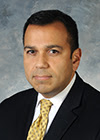Bill for panels to review lawsuits against health-care providers passes Senate, gets off House fast track but still headed for law

By Melissa Patrick
Kentucky Health News
FRANKFORT, Ky. – A bill to require a panel of three physicians to determine if lawsuits against health-care providers have merit before being filed in court has passed the Senate will likely become law next month.
 |
| Sen. Ralph Alvarado |
Senate Bill 4, sponsored by Republican Sen. Ralph Alvarado, a Winchester physician, cleared the Senate Health and Family Services Committee on an 8-3 vote Jan. 3 and passed the full Senate 23-13 on Thursday, Jan. 5.
It would establish panels of three medical experts, two chosen by each side and the third chosen by the other two, to review suits against health-care providers to determine if the case has merit before the lawsuit can proceed. Panel findings would be admissible in court, but not legally binding.
Such legislation has passed the Senate before, but died in the House, which was controlled by Democrats. The bill was on a fast track to pass the House Saturday, with other priority bills of the new Republican majority, but freshman Rep. Jason Nemes, R-Louisville, said on Facebook that at his request, action on it was delayed until legislators return in February.
Last year’s Senate committee debate on the legislation took about two hours. This year’s consumed about 20 minutes.
“These review panels are a reasonable, common-sense approach that protects caregivers and their patients,” he said. “It does not limit, delay or deny a plaintiff’s access to courts, any claim can still proceed. It does not create additional cost for a patient or their family to sue a health care provider. It does not bind a jury from determining findings of fact and conclusions of law. It does not create an additional layer between the citizen and the courts. It does add a layer of accountability for health-care providers and personal injury lawyers.”
Such lawyers are represented at the legislature by the Kentucky Justice Association. Liz Shepherd, president of the group, said it recognizes that the political environment has changed but still wants “a seat at the table” to protect citizens’ rights under the Seventh Amendment to the U.S. Constitution.
“We want to be part of the solution, but at the same time protect a client’s right to trial by jury,” Shepherd said. “There are a lot of public reports that show a small percent of doctors cause most of the medical negligence claims, and what we are concerned about is that there will be a wholesale change with unintended consequences that is really there to address the problems of a very few doctors and very few attorneys.”
In support of the bill, David Adkisson, president and CEO of the Kentucky Chamber of Commerce, pointed out that all of the states bordering Kentucky have some kind of tort reform. “In the business community, we think it’s time for Kentucky to catch up and make this a better place for medical providers to operate and for consumers to purchase health services,” he said.
Alvarado said the panels are expected to issue an opinion on the claim within six months of the panel’s selection. He said that under the current process, cases can take up to four years to litigate.
Sen. Reginald Thomas, D-Lexington, said testimony in previous years said such panels in other states take up to two years to issue an opinion, thus delaying the time it takes plaintiffs to get their claims heard.
“I vote no, because I believe every person who is a citizen of the state should have access to the courthouse door,” Thomas said. “I believe in justice. I believe in everyone having their day in court. Everyone has a right to be heard.”
Alvarado disputed Thomas’s assertions, saying that his research from Indiana’s program found that the review process is timely and “works very well.” He also said if both parties want to bypass the review panel, the bill allows for that.
Sen. Tom Buford, R-Nicholasville, voted for the bill, but said he had some concerns that the review panel is made up entirely of medical professionals, which he said, “I think is a mistake for the justice of the individual.”